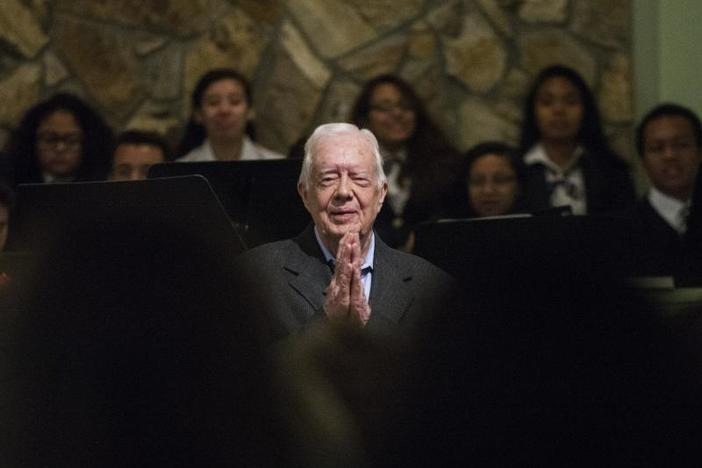Updated with verified details from The Carter Center, The Associated Press, CNN, NPR, and other authoritative news sources.
Former President Jimmy Carter, the 39th President of the United States and the nation’s longest-living former leader, has entered hospice care at the age of 98. The Carter Center, the nonprofit organization founded by Carter and his wife Rosalynn, announced the update in a public statement on February 18, 2023.
According to the official statement, President Carter decided to transition to hospice care at his home in Plains, Georgia, after experiencing a series of short hospital visits. In alignment with his long-standing values of family, simplicity, and dignity, he chose to forego further medical intervention and instead spend his remaining time surrounded by loved ones.
A Life of Public Service and Humanitarian Legacy
Jimmy Carter’s life has been one of profound public service. Born in Plains, Georgia, in 1924, he graduated from the United States Naval Academy and served as a naval officer before returning to Georgia to manage his family’s peanut farm. He entered politics in the early 1960s, eventually becoming Governor of Georgia before launching a successful presidential campaign in 1976.
As President from 1977 to 1981, Carter is known for a number of significant achievements in both domestic and international affairs. His administration oversaw the creation of the Department of Energy and the Department of Education, and he played a critical role in negotiating the Camp David Accords between Egypt and Israel—one of the most impactful peace agreements in the Middle East.
After leaving office, Carter remained active in public life through humanitarian work, conflict resolution, election monitoring, and global health initiatives. In 1982, he and Rosalynn Carter founded The Carter Center, a nonpartisan organization committed to advancing peace and health worldwide. The Center’s efforts have included fighting neglected tropical diseases, promoting mental health, supporting democratic elections, and improving access to healthcare in underserved regions.
In 2002, Carter was awarded the Nobel Peace Prize for his decades of “untiring effort to find peaceful solutions to international conflicts, to advance democracy and human rights, and to promote economic and social development.”
Health Updates and Decision for Hospice Care
The Carter Center’s February 2023 announcement marked a solemn moment for many Americans who admire President Carter’s enduring legacy. The organization stated that, after recent health challenges and multiple brief hospital stays, the former president elected to enter hospice care—a form of supportive treatment provided to individuals in the final stage of life.
Hospice care focuses on comfort and quality of life, and it often includes pain management, emotional support, and spiritual care for the individual and their family. President Carter’s decision reflects his desire to remain at home with his loved ones during this time.
While the Center did not disclose specific medical conditions prompting the decision, Carter has previously shared details of health concerns in past years. In 2015, he publicly announced that he had been diagnosed with cancer that had spread to his brain. After undergoing treatment, he was declared cancer-free later that year. Since then, he has faced other age-related health challenges, including falls and hip surgery, but remained active in public and faith-based community service as recently as 2019.

National and Global Reaction
News of President Carter’s decision was met with an outpouring of respect, admiration, and well wishes from individuals and organizations across the political spectrum and around the world. Leaders from both major U.S. political parties, humanitarian groups, and citizens alike have shared messages of gratitude for his lifetime of service.
In Plains, Georgia—Carter’s longtime hometown—community members and local officials expressed deep respect for the former president and his contributions to their town and beyond. Over the decades, Carter has remained closely connected to his hometown, teaching Sunday school at Maranatha Baptist Church and engaging with residents regularly.
Social media platforms were filled with tributes using the hashtag #PrayersForCarter, underscoring the public’s appreciation and support for a leader who dedicated much of his post-presidential life to humanitarian causes. Many noted that Carter redefined what it meant to be a former president by remaining deeply committed to service well after leaving the White House.

Continuing the Carter Center’s Mission
Even as President Carter transitions into hospice care, the Carter Center remains actively engaged in its global mission. The organization has helped eliminate diseases such as Guinea worm and contributed to fair election monitoring in over 100 countries. It continues to collaborate with governments, civil society groups, and healthcare systems to promote equity and peace.
Supporters and donors have rallied around the Center’s ongoing work, viewing it as a continuation of Carter’s vision and leadership. The Center encourages individuals who wish to honor President Carter’s legacy to contribute to humanitarian projects, volunteer in their communities, or support causes that align with Carter’s lifelong values—such as peace, health equity, and civil rights.

A Historic Presidential Legacy
As one of the most active and respected former U.S. presidents in history, Jimmy Carter’s influence extends far beyond his time in office. His commitment to democratic principles, international diplomacy, and compassionate leadership has made him a widely respected figure both at home and abroad.
Throughout his post-presidency, Carter has consistently prioritized service over political influence. His humility, integrity, and devotion to human dignity have set a powerful example for public servants across generations.
His choice to enter hospice care reflects a continuation of those values—choosing peace, family, and authenticity in a deeply personal decision. The nation joins in sending prayers and support to President Carter and the Carter family during this time.
Sources for Verified Information:
- The Carter Center
- Associated Press
- NPR Coverage
- CNN Politics
- White House Archives – Carter Presidency Overview
- Nobel Peace Prize – Jimmy Carter (2002)

